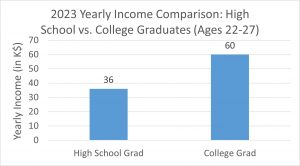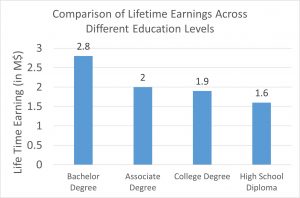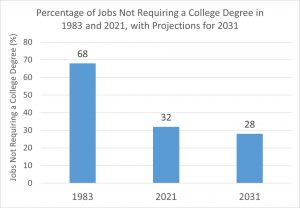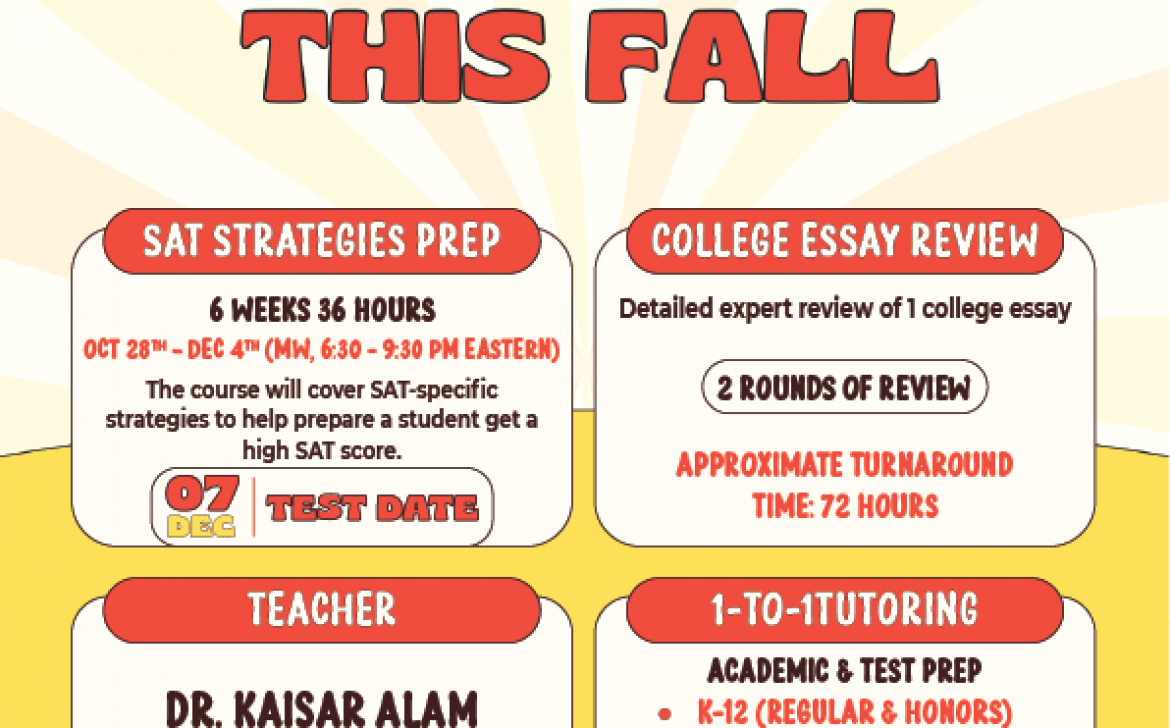Why College?
by Aatina K. Shaikh and Dr. S. Kaisar Alam
Included in this article:
- Why should you go to college?
- College cost might be low or even free for some
- Potential for higher earnings and improved lifestyles
- Exclusive access to some jobs
- Better professional networking
- Effects on the society
- Personal growth
- Final words
Why should you go to college?
Attending and finishing a 4-year college is one of the major decisions in life. You will hear a lot of conflicting advice about going to a 4-year college, especially on social media. “You’re in for a rude awakening when you get to college! College professors won’t be this lenient! Make sure your resume is filled with things colleges love!” It’s easy to get tired of these phrases when you’ve been hearing them your whole life. We are constantly bombarded by the lives of social media influencers who were able to skip college and still rake in a more than decent income. The yearn to drop out or not even attend college in the hopes of obtaining this lifestyle, which definitely isn’t a guarantee for everyone who decides to put themselves out there online, is risky. This is not to say that doing so will always lead to failure. It can definitely work for some, though the chances are low, so dropping college to pursue a social media career is not fully worth the risk.
In this article, we try to answer the question, “Why should you go to college?” We strongly believe that going to college is beneficial for most people.
College cost might be low or even free for some
College costs can be low or even free, for some students. If your family is under a certain income level, certain schools (T-20s, Ivies, and even state schools) will cover your entire tuition, housing, and other costs. Who doesn’t love free college? A college education that comes at a much lower cost to you or your family can only benefit you, even if you choose a lower paying major. Educational Data Initiative reports, “87.3% of first-time, first-year undergraduate students receive financial aid in some form.”
If you don’t fall into the income bracket for need-based aid, there is still the opportunity to receive merit scholarships that will cover substantial portions of your tuition. There are options available to bring the sticker price down. Even if the prices of universities or colleges are out of your reach, beginning college at a community college is an option. According to US News, community colleges can be an affordable way to start college before transferring to a four-year college. This allows the students to receive a college degree, while saving substantial money in the process. The other advantages include, smaller classes, flexible schedules, proximity to home, and workforce training.
Potential for higher earnings and i mproved lifestyles
A college degree can lead to major to positive outcomes including a high paying job in four years. If you can receive college credits via transferring AP, IB, Dual Credit, etc., you can graduate faster and at a lower cost.
The US Bureau of Labor Statistics found that “workers’ earnings increase as educational attainment rises.” It takes a simple Google search to find the annual salaries for a certain major, career, or field. For some careers, this can be up in the range of half a million dollars as their annual salary. Open AI engineers can make up to $900k per year!


Axios reported that in 2023 recent college grads (age 22-27) earned $24,000 more per year working full-time than similarly aged individuals with a high school degree ($60,000 vs. $36,000). Lifetime earnings are much higher for people with a Bachelor’s degree (2.8M) than with an Associate degree (2.0M), some college (1.9M), or high school diploma (1.6M). According to Institute for Higher Education Policy, many colleges (2,414 or 83% of schools, serving 18.3 or 93% of US undergraduates) provide a 10-year positive ROI (students earning equaling or exceeding what a high school graduate earns, plus enough to recoup their college investment within ten years).
According to the Bureau of Labor Statistics, High school graduates are almost 40% more likely to be unemployed and, according to the Pew Research Center, almost four times more likely to be poor. According to Pew Research, people without a college degree were 3 times more likely to have lost their jobs at the height of COVID19 pandemic.
A Georgetown University report states, “postsecondary education is no longer just the preferred pathway to middle-class jobs—it is, increasingly, the only pathway.”
Exclusive access to some jobs

Some jobs require a college degree. If you want to be a physician, a nurse, or a lawyer, you will need a relevant degree. Furthermore, engineers, social workers, psychologists, teachers, public sector employees, and others also need a degree. Although the number of college graduates has been decreasing, demand for them is increasing. In fact, fields requiring educated workers have been growing faster than fields requiring less-educated workers. Thus, the percentage of jobs requiring more qualifications (than a high school degree) has been going up. In 1983, 68% of US jobs did not require more than a high school diploma. In 2021, this number was down to 32%. According to a report from Georgetown University’s Center on Education and the Workforce, 72% of jobs in the country will require a college degree or some sort of post-secondary training by 2031. The report disagrees that automation will kill jobs and states, “automation primarily will eliminate specific tasks within jobs rather than wipe out entire jobs.” In fact, it estimates the number of jobs will continue to grow to 171 million jobs in 2031, up from 156 million in 2021.
In many areas, your potential to grow professionally is much more limited without a college degree. According to Pew Research, “about half say their college experience was very useful in helping them access job opportunities (53%) or in helping them develop skills and knowledge they could use in the workplace (49%).” A college education allows you access to work in a prestigious field, while also developing your personal self as you do so.
Better professional networking
“Who you know” might sound like a cliche, but it is true. As you advance through your career, networking becomes essential, including when you are looking for a job. When in college, you can create connections with others and build your network. Surveys show that people with college degrees have larger networks (including with community leaders) than those without one. You might live with a few others in a dorm or an apartment while in college. You make friends with people you take classes with. You can make new friends while being in a club or a sports team. I personally have benefitted many times from my alumni network at IIT, Kharagpur, including getting access to consulting opportunities that were not advertised.
I have seen firsthand how having the right connections has allowed people to skip the entry level portion of their field since they had been working with someone to gain experience. They are later hired within the organization of that connection with strong recommendations to go with them. One time, someone reached out to me to sell life insurance. The only reason I did not hang up on him was that he was an alumnus from my graduate school the University of Rochester.Can you find a current employee as a reference when applying for a position? It will make your application stronger.
Remember, the connections you make in college can stay with you as long as you maintain them.
Personal growth
When you attend college, you have to adopt a structured personal lifestyle. You are forced to manage your priorities in a way to ensure you can fulfill all of your responsibilities. You will be busy with assignments and exams, leadership roles in clubs, and working a job, while maintaining a social life. Being able to balance all of that is a skill that will remain beneficial to you as your personal responsibilities expand. Aside from that, having assignments with deadlines can get you used to working with tight deadlines, possibly while juggling multiple tasks in your career. This is true whether you decide to go into marketing and are working with multiple big clients or if you are an attorney who has multiple cases to present in the courts on the same day. You will need to learn how to keep everything balanced to maintain your competitive status within the workplace. College teaches you many life skills that allow a person to mature faster and more efficiently as they are allowed the independence to choose their own path.
We should not forget about clubs and student organizations, which can substantially aid in personal growth. Rutgers University, New Brunswick has over 750 student-run clubs. UCLA has over 1,200 and Princeton University has more than 500. Even smaller colleges like TCNJ has more than 230 and Kenyan has more than 100. You can try various activities from tennis, robotics, yoga, or even knitting. Most colleges also have career centers that can help you find summer internships. These can help you explore a career that interests you. If you like the work environment and can make a good impression on your colleagues, you can most likely get a job within the organization.
Effects on the society
There are long-term consequences of college education. If the US falls behind in college education, the US will lose the competitive advantage against nations like China, which are increasing their college attendance. High school graduates were two and a half times more likely to be on Medicaid, four times as likely to get food stamps, four times as likely to need public housing, and their children are three times more likely to receive free school lunches. People without college educations also are less likely to vote, half as likely to volunteer, and more likely to divorce. Nearly 50% of married couples with less education split up; for college graduates, the rate is 30%.
Studies have shown that college education even affects life expectancy. Between 2010 and 2017, estimated life expectancy declined for those without a 4-year college degree and increased for those with a college degree.
Jennifer Ma, Executive Research Scientist at the College Board issues this warning, “There will be fewer jobs that people can get with just a high school diploma, so this will be an issue as more and more jobs require a college degree but fewer and fewer students go to college.” This could set off a series of cascading effects. Jason Lane of Miami University said, “What we’re seeing right now is hospitals understaffed, supply chain concerns, schools closing because we don’t have enough people to keep them open,” he said. “But what happens when we don’t have enough people studying to be teachers, or to be nurses?”
Final words
As we mentioned earlier, there are definitely people who are able to become successful without a college degree, but they are also outliers. Society needs to continue gaining an education as a whole if we want to continue to advance ourselves. Everything is possible, so while you can attempt nontraditional routes, it may be smarter to do so alongside working to academically advance yourself through attending college. There are many influencers who continue to go to college even after their rise to fame. Take Noah Schnapp. He is going to UPenn (an ivy league) even after his major success in Hollywood. If he can go to college, we can all go to college. Having that paper that displays your college education can be a huge stepping stone in the labor market, where it has become competitive for almost all positions. There is a lot that a college education can do for you and one is ensuring a decent, livable salary. I want to emphasize how important this can be, especially for students who come from a family where you can’t fall back on your parents. A college education is a ticket to a life where your future is more secure.
College admissions and SAT/ACT prep help
If you need help with your college essay, Prep Excellence can help. Feel free to inquire about these services to cater to your needs specifically.
It’s never too early to start preparing for the SAT and ACT. If you need help with your test preparation, please check out our blog and YouTube channel. Prep Excellence offers several industry-leading test prep courses and top SAT and ACT tutoring that you can take advantage of.
Reviewed by Ashfaque Rahman and Kurratul Ayin



